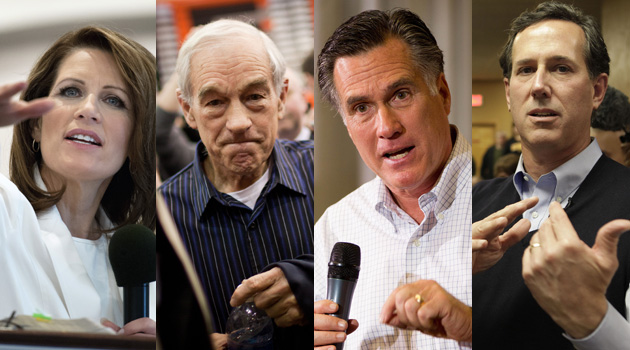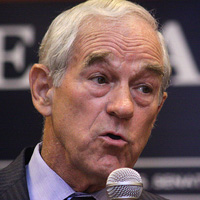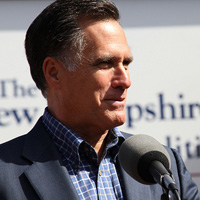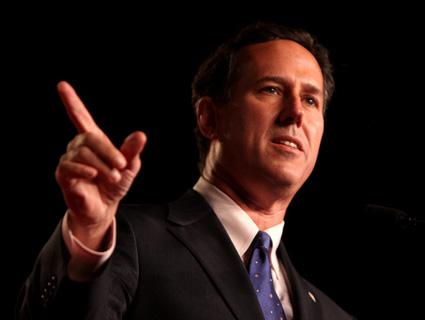 Bachmann:Glen Stubbe/Minneapolis Star Tribune/Zuma; Paul, Romney: Andrew A. Nelles/Zuma; Santorum: Jerry Mennenga/Zuma Read on for the Mother Jones news team’s analysis of Tuesday night’s Iowa caucuses. Need some background? Check out our field guide to the caucuses and learn how the Republican caucuses actually work. For the absolute latest, follow MoJo reporters Tim Murphy and Gavin Aronsen live from Iowa.
Bachmann:Glen Stubbe/Minneapolis Star Tribune/Zuma; Paul, Romney: Andrew A. Nelles/Zuma; Santorum: Jerry Mennenga/Zuma Read on for the Mother Jones news team’s analysis of Tuesday night’s Iowa caucuses. Need some background? Check out our field guide to the caucuses and learn how the Republican caucuses actually work. For the absolute latest, follow MoJo reporters Tim Murphy and Gavin Aronsen live from Iowa.
The Ron Paul Show Goes On
 Gage Skidmore/Flickr
Gage Skidmore/Flickr
Ron Paul took to the podium at the Courtyard Marriott hotel Tuesday night to celebrate results in Iowa that didn’t quite live up to expectations. While he led in the polls just days ago, he finished third, with 21 percent of the vote. If the Paul devotees packing the room were feeling disappointed, they did a good job of hiding it. They offered exuberant cheers of appreciation that Paul returned with gracious praise for their countless hours of campaign work. Paul’s supporters are still optimistic he can capitalize on the momentum that catapulted him from something of a fringe candidate in 2008 to a contender in Iowa in 2012.
“I really thought he’d get second, if not first,” 59-year-old Eric Riedinger, of Des Moines, told me. “I was a little bit shocked by Romney’s turnout in my district,” Mike Fortune, a 39-year-old caucus-goer from West Des Moines, said. But, Fortune added hopefully, Paul’s third place finish means that “he’s now officially in the top tier.”
During his speech Tuesday night, Paul told his supporters that he was “one of two [candidates] who can run a national campaign and raise some money,” presumably a shot at the surging Rick Santorum, who will now be scrambling to build out his campaign operation elsewhere. “There were essentially three winners, and we will go on,” Paul continued. “We have a tremendous opportunity to continue this momentum. It won’t be long that there’s going to be an election up in New Hampshire.”
But Paul’s time to get out the vote may be running out. Mitt Romney has consistently held more than a 20-point advantage in the polls over Paul in New Hampshire, whose primary is next Tuesday. And in South Carolina, which votes on January 21, Romney and Newt Gingrich both hold double-digit leads over Paul.
Iowa’s first-in-the-nation caucus was the candidate’s best opportunity to create real momentum and cement his status as a contender for the GOP nomination. The state’s same-day voter registration was perfectly tailored to the non-traditional voters to whom Paul owes much of his success. They didn’t turn out in large enough numbers, though, to overcome Iowans’ tendency to flock to a social conservative. Nor could they ultimately compete with a wider focus on Mitt Romney as perhaps the only candidate with a real shot to beat Obama. Yet the energy behind Paul remains substantial, and he’ll continue to have an effect on the race at least in the near term. Earlier in the night, when returns showed Paul in a three-way tie for first, one supporter in the crowd summed up the night succinctly, shouting, “We may not win, but we’ve got the passion!”
Rick Santorum: “The Militant” Candidate
They’ve tallied up the results at Johnston, Iowa’s precinct 481 and the big winner is…well, that’s not totally clear. But here are the basics: Out of 335 votes cast, Mitt Romney claimed 76; Rick Santorum had 75—and further down, Michele Bachmann had 15; Jon Huntsman trailed former Alabama supreme court judge Roy Moore, by a 2 to 1 margin (Moore had 2, Huntsman had 1). Huntsmentum, feel it.
Over at Santorum headquarters at the Stoney Creek Inn in Johnston, the mood is fairly jubilant. There’s a sizable crowd around the television, chanting “Rick! Rick! Rick!” (and the occasional ear-piercing whistle) whenever Fox News returns from commercial and updates its results. Steven Wagner’s monitoring the television, as the results begin to show, for the first time, Santorum, creeping into first place. He’s actually from DC—he flew to Iowa this weekend because Santorum’s a family friend. And as much as it might pain him to say it, he wasn’t quite sure Santorum was ever going to catch fire. “I was really waiting for Rick to make a move and was kind of perplexed as to why he hadn’t caught on,” he says. “I didn’t think that it was his year, in a structural sense. There was somehow this environment in Iowa that was preventing him from catching on.”
But now that he’s caught on, Wagner thinks there’s no stopping him. “I think Rick’s the kind of militant candidate that’ll give the president a run for his money. He means what he says to his bones.”
Undecided in Iowa
Through some stroke of luck*, I’ve made it to a caucus location at an evangelical church in Johnson, Iowa—just down the street from Rick Santorum’s caucus night party at the Stoney Creek Inn. The stage is still set for Christmas services—there are five Christmas trees on stage, and a baby grand piano; the place is about three-quarters full. Santorum’s wife, Karen, is here and, by all accounts, she gave voters the hard sell (although it was Santorum’s Florida campaign chair who gave the official endorsement speech).
One quirk of the caucus system is that, at each location, each candidate has an official endorser. An endorsers’ pitch can have a big impact on how voters come down. None of the voters I spoke with were 100 percent sure who they were going to vote for. Here are four snapshots from the crowd:
- Tara Helwig: “I’m not completely sure. I’m swayed a little, but it’s possible I’d switch.” Her candidate for now? “Mitt Romney. I just kinda feel like”—she motions to her friend sitting next to her—”we were discussing this. He’s the one with the most experience in the area I’m most concerned about.” That’s the economy. “I’m not saying for sure; I’m not saying definitely. I chatted with [Ann Romney] and she answered some of my questions very well.” But not her questions on Santorum’s experience on the economy. That’s key. She voted for Romney in 2008, too.
- Lee Sellneyer: “I guess for me, maybe Romney and Santorum.” He’d met Karen Santorum a few moments earlier, and it’s part of the reason he’s thinking of voting for him. “She basically just talked about his issues, the economy, right to life. I mentioned being NRA and she said she was. I’m impressed that she’s doing it. It’s a lot of effort.” He voted for Huckabee in 2007.
- Alan and Barbara Morton: “I think we’re getting close,” says Alan, wearing a Packers hat. They’re leaning toward Rick Santorum “because we talked to his wife,” Alan says. “We’ve been flipping back and forth between Herman Cain and Rick Perry and Rick Santorum.” Their one concern about Perry: He’s not on the ballot on Virginia—and just as important is how he responded to that. They docked points from Perry when he filed suit in federal court to reverse the state GOP’s decision, pointing out that it contradicted his 10th Amendment arguments. They voted for Fred Thompson in 2008, “and then he dropped out.”
- Liz Smith: “I’m not 100 percent,” but she’s leaning toward Ron Paul. “I just think he’s different—he’s way different from what we have.” What could sway her away from Paul? “Possibly hearing more of the candidates’ stances on education.” (As it happens, that’s pretty much all Bachmann’s endorser talks about.) Smith voted for Obama in 2008, but says she won’t make that mistake again.
As I write this, they’re voting. It’s mostly quiet, although one guy is concerned that the press will be allowed to vote (we won’t be). The endorsements were fairly low-key, the highlight probably coming when Ron Paul’s endorser bragged that Paul had voted to authorize the use of force to go after “Obama.” It was a slip-up, and he apologized for it, but he was greeted with laughs and a round of applause.
*By which I mean “no traffic”; these events are open to the public and press—they even allow you to register to vote right before you go in. Voter fraud, it turns out, only becomes a serious issue when you allow Democrats in.
The Newtification of Mitt Romney
 Mitt Romney/Flickr
Mitt Romney/Flickr
Mitt Romney has a habit of posing for applause before it begins, a quirk that’s made only slightly less awkward by the fact that over the last five years he’s become pretty good at guessing when the applause will come. When he’s just delivered a jab, such as—seizing on President Obama’s suggestion that he’d be a one-term president if he didn’t turn things around—”we’ve come to collect!” there’s a brief moment, before the hands start coming together, where Romney stops, smiles in an “Oh boy, I really said it, didn’t I?” kind of way, drops both arms to his side, and rotates 90 degrees to receive the adulation. The energy isn’t infectious, but his message is sinking in with Iowans—perhaps because he’s gotten a rhetorical makeover from an unlikely source.
Even as his allied super-PAC spent $3.5 million hammering Newt Gingrich on the Iowa airwaves, Romney himself is channeling the former House speaker’s bombast. Belying his reputation as a lily-livered moderate, he packs his speeches with red meat. In Council Bluffs on Sunday, he said that President Obama has no jobs plan (let me Google that for you), and that Obama will create a society that “substitutes envy for ambition.” At one point, he told the crowd about a little old song he’s quite fond of:
“That wonderful hymn, ‘America the Beautiful,’ there’s a stanza that begins, ‘Oh, beautiful, for patriot dreams, that sees beyond the years.’ I believe the founders, the patriots, and their dream of America was not to establish a nation that would last for a little while, but principles that would be enduring,” Romney says. “I believe in those principles. One of those principles was that we would be a merit society. An opportunity society.” The son of the former governor of Michigan and CEO of General Motors pauses to reflect on the Founding Founders’ vision of an America in which it doesn’t matter who your daddy is: “I think President Obama has a different view! I think he looks to Europe and sees the European welfare state as a model. An entitlement society!”
He hits those points over and over. Opportunity, opportunity, opportunity. Never mind that the founders’ vision of a meritocracy was one in which wealthy first-born sons of affluent, white male landowners were free to compete with each other to see who could accumulate more wealth in an economic system built on forced immobility. The point here is that Romney is speaking Newt Gingrich’s language.
As far as ideologically motivated modern tongues go, Esperanto gets most of the love, but Gingrich’s GOPAC tapes should at least be a part of the conversation. Beginning in the late 1980s, under the auspices of his political action committee, Gingrich began recording audio cassettes for conservative state and congressional candidates across the country, something they could listen to in the car on the long drives between campaign events or trips to the state house. It was an exercise in mind control, albeit consensual.
“If you’ll fly with us, work with us, fight with us, we are going to create a real revolution, we are going to replace the Welfare state,” the voice of Gingrich would say. “You want to replace the Welfare state with an opportunity society. You favor workfare over Welfare. You want to lock prisoners up and you’re actually prepared to give up some political pork barrel to build as many prisons as you need.” You will assassinate the prime minister of Micronesia. The key to it all was that dichotomy of a “conservative opportunity society” versus a “welfare state” (usually preceded by a modifier like “corrupt” or “bureaucratic”).
It was Gingrich’s pièce de résistance, a formulation he’d crafted and applied wherever could. At the time Gingrich was distributing his “Talk like Newt” tapes, Romney was running as a progressive Republican who refused to sign the Contract with America. Now he’s spouting Gingrich’s talking points like a true believer.
Romney has the message discipline Gingrich can only seem to bring about in others, which might be part of the reason why Gingrich has begun to unload on his rival. On Tuesday morning, he told Fox News that Romney was a “liar” for saying he had nothing to do with a spate of anti-Gingrich super-PAC ads—which, if accurate, would mean that Romney violated federal election laws. The candidate who once mused that the biggest problem with the Republican party is that it’s not “nasty” enough is getting a dose of his own medicine, and he’s none too happy about it.
Ron Paul’s Wildcard: Iowa Progressives?
With a New Year’s Day poll showing Ron Paul in a three-way tie with Mitt Romney and Rick Santorum going into Tuesday’s Iowa caucuses, who will emerge victorious is anyone’s guess. If it’s Paul, the conventional wisdom goes, he will owe much of his success to a weak Republican field and an adoring flock of disillusioned youth, hundreds of whom have traveled from out of state to work behind the scenes. But there’s one other wild card: Paul’s crossover appeal to liberals attracted to his anti-war platform.
On Monday morning, Ron Paul, introduced by his son, Kentucky Sen. Rand Paul, spoke briefly at a downtown Des Moines hotel. Afterward, several Paul supporters told me that they supported the candidate for opposing the National Defense Authorization Act, recently signed into law by Obama, which codified the indefinite detention of terrorist suspects arrested in the United States. Joe Scarborough, host of MSNBC’s Morning Joe, was in town for the Paul event. Later, at his nearby hotel where the Democratic National Committee houses its caucus-prep “war room,” he watched occupy protesters echo many of the same complaints about the NDAA. “The only people in America who understand NDAA—I think it’s fascinating—are Occupy Wall Street and Ron Paul supporters,” Scarborough told me. “But you want to talk about the 99 percent—99 percent of Americans have no idea what this is all about.”
Francis Thicke, an organic farmer from Fairfield, Iowa, who ran for secretary of agriculture on the state’s Democratic ticket in 2010, announced that he would caucus for Paul on Tuesday “to keep his voice for peace and his voice to reduce the military in the debate, because he will challenge the other Republican candidates.” Thicke told me that although a Democratic county chairman responded by telling him that he was “stabbing them in the back” by supporting a Republican, he would vote for Obama over Paul without a doubt, because he doesn’t support dismantling the government. “This is a tactical thing” to expand voters’ awareness, Thicke said.
Thicke isn’t the only progressive aiming to use the GOP caucuses to make his own point: Some Occupy protesters have been pushing supporters to show up at the caucuses and vote “uncommitted” in hopes of sending a few of their own delegates for the national convention. But there’s disagreement in the Occupy ranks over this approach. Local radio show host Ed Fallon, a former state representative whose 2006 gubernatorial campaign I volunteered on, has been one of the most visible members of Occupy Des Moines, and on Monday he sent an email encouraging his fans to either attend the Democratic caucuses and cast an “uncommitted” protest vote there or to support “one of the less extreme candidates: Ron Paul, John Huntsman, Buddy Roemer or Fred Karger” on the Republican side.
Thicke told me that while he doesn’t know many other Democrats who plan to caucus for Paul, he thinks a turnout of unconventional voters could put the candidate over the top, pointing to polling that has excluded independents. But at Occupy Des Moines’ headquarters, things didn’t look so hopeful for the libertarian. After Monday’s protest against the DNC, an occupier tried to kick off a sympathetic mic check thanking Paul for opposing the NDAA. “We love you Ron Paul,” he shouted out. “Let’s hear it for Ron Paul!” He was met with a chorus of boos.















